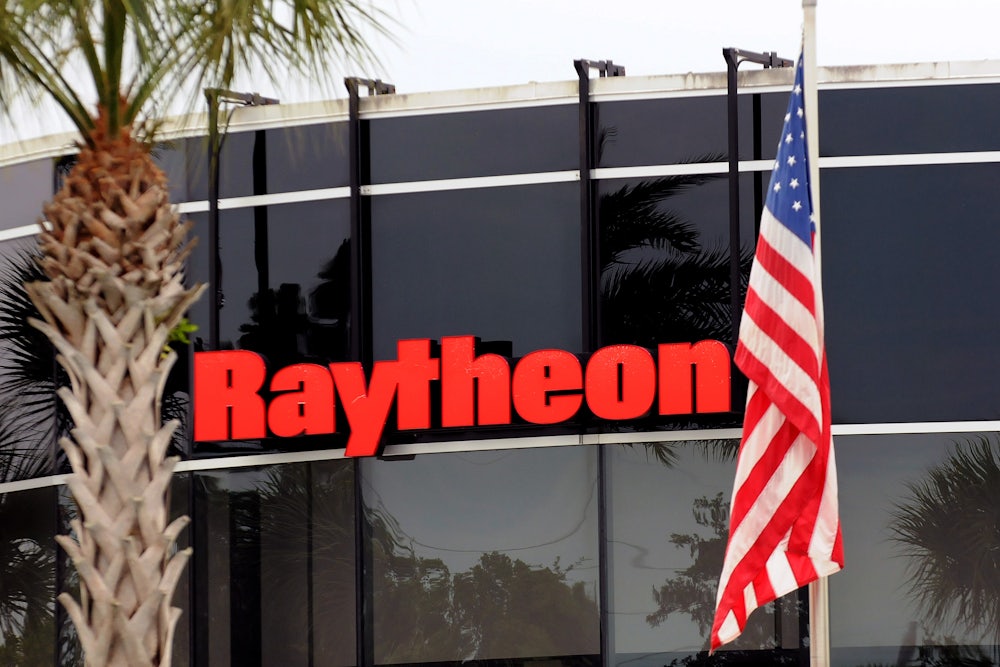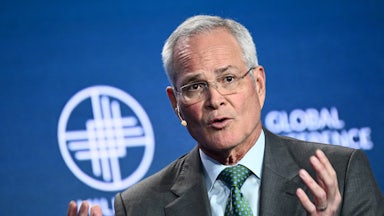What is ESG? If you’re like most Americans, you don’t really know. Big banks and asset managers have come under fire from the right in recent years for considering “environmental, social, and governance” factors in their investment decisions. Yet as Republican attempts to target all things ESG face increasing challenges at the state level, the definition of what actually counts as ESG has become increasingly murky.
At the end of last year, 1,238 funds claiming to “promote” environmental, social, and good governance goals held stocks in the industry classification code “Aerospace & Defense,” including weapons manufacturers like Raytheon and Lockheed Martin. The Financial Times reported recently that sustainable investment funds in Europe have more than doubled their exposure to defense stocks since Russia invaded Ukraine in early 2022. “About a third of funds in Europe and the U.K. focused on environmental, social and governance issues now have €7.7bn invested in the sector, compared with €3.2bn in the first quarter of 2022, according to an analysis for the Financial Times by Morningstar Direct,” the FT reports.
Just this week, Politico noted that a hotly anticipated report on EU competitiveness compiled by former European Central Bank chief Mario Draghi—expected to be released next Monday—will suggest modifying the EU Sustainable Finance Frameworks and Environmental, Social and Governance so as to benefit the defense sector. He discussed the forthcoming report on Wednesday in a closed-door, high-level meeting at the European Parliament.
None of this is a hot-button electoral issue in the United States, despite GOP attempts to make it one. Just 31 percent of likely voters in battleground states know what the acronym means, per a recent survey by Rasmussen Reports. The same survey did show that 63 percent of the relatively small percentage of voters who are familiar with ESG would support laws barring financial institutions from using “non-financial ESG scores” when evaluating individuals and businesses applying for products or services like loans.
Meanwhile, in Texas—which in 2021 passed some of the country’s first-ever restrictions on ESG investing—the American Sustainable Business Council is suing Republican state officials over those very policies. The suit, filed in the U.S. District Court in Austin, alleges that the law, targeting financial institutions deemed to be boycotting oil and gas producers, violates companies’ First Amendment rights. A similarly worded anti-ESG law, the Oklahoma Energy Discrimination Act of 2022, was temporarily blocked in Oklahoma in May after a similar lawsuit was filed there.
That ESG-branded funds are investing in companies that manufacture weapons of war—including those used in the Israeli government’s assault on Palestine—is ironic on a few different fronts. For one, wars are enormously carbon-intensive; one recent study found that emissions from the first 120 days of Israel’s war on Gaza “exceeded the annual emissions of 26 individual countries.” The Transnational Institute has estimated that NATO’s $1.34 trillion in overall military spending in 2023 produced more greenhouse gas emissions than Colombia or Qatar, both major fossil fuel–producing countries, typically do in a year.
Texas’s anti-ESG legislation was also explicitly modeled on measures targeting the boycott, divestment, and sanctions, or BDS, movement, inspired by Palestinian civil society groups’ call to put economic pressure on Israel’s long-standing military occupation of the West Bank, Gaza, and East Jerusalem. Last October, Florida Governor Ron DeSantis used the anti-ESG law he championed to place Morningstar-Sustainalytics on a state blacklist for listing investments in Israel as an ESG risk. “We will continue to invest in companies that provide Floridians with the best return on investment and not companies that utilize arbitrary ESG metrics to advance a BDS agenda,” DeSantis said in a press release announcing the decision.
DeSantis got one thing right: ESG metrics are indeed pretty arbitrary. At the most basic level, “ESG” refers to environmental, social, and governance factors that companies use to make pretty ordinary business decisions: If a corporation’s board is composed entirely of white men, for instance, it might opt to bring on more women and people of color to prevent public backlash. Corporate managers may well choose to make these kinds of decisions and not refer to them as “ESG.”
In that respect, ESG is perhaps best thought of as a marketing tool: Companies might as well advertise run-of-the-mill profit-seeking behavior as environmentally or socially responsible so as to court more liberal customers or investors or to curry favor with governments. ESG often, of course, refers to certain types of investment products—typically, passive index funds that individuals or institutions, such as pension funds, might choose due to the fact that they screen out certain companies based on environmental, social, or governance-related harms.
As ESG funds’ increasing investments in weapons manufacturers show, combatants on either side of the wars over ESG have tended to ignore the fact that it was never meant to do anything other than drive up profits. That so-called sustainable investment funds are now padding the pockets of arms manufacturers means ESG may well be driving up death tolls too.










